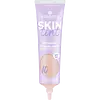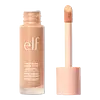What's inside
What's inside
 Key Ingredients
Key Ingredients

 Benefits
Benefits

 Concerns
Concerns

 Ingredients Side-by-side
Ingredients Side-by-side

Water
Skin ConditioningTitanium Dioxide
Cosmetic ColorantTributyl Citrate
SolventButylene Glycol
HumectantDicaprylyl Ether
EmollientEthylhexyl Triazone
UV AbsorberMyristyl Lactate
EmollientC13-15 Alkane
SolventSilica
AbrasiveDiethylamino Hydroxybenzoyl Hexyl Benzoate
UV FilterBis-Ethylhexyloxyphenol Methoxyphenyl Triazine
Skin ConditioningPolyglyceryl-6 Polyricinoleate
EmulsifyingPolyglyceryl-6 Polyhydroxystearate
EmulsifyingTalc
AbrasiveMagnesium Sulfate
Dimethicone/Vinyl Dimethicone Crosspolymer
Skin ConditioningAloe Barbadensis Leaf Juice Powder
Skin ConditioningSodium Hyaluronate
HumectantTocopherol
AntioxidantCetyl Alcohol
EmollientDextrin Palmitate
EmulsifyingPolyglycerin-6
HumectantXanthan Gum
EmulsifyingTriethoxycaprylylsilane
Phenoxyethanol
PreservativeCI 77491
Cosmetic ColorantCI 77492
Cosmetic ColorantCI 77499
Cosmetic ColorantWater, Titanium Dioxide, Tributyl Citrate, Butylene Glycol, Dicaprylyl Ether, Ethylhexyl Triazone, Myristyl Lactate, C13-15 Alkane, Silica, Diethylamino Hydroxybenzoyl Hexyl Benzoate, Bis-Ethylhexyloxyphenol Methoxyphenyl Triazine, Polyglyceryl-6 Polyricinoleate, Polyglyceryl-6 Polyhydroxystearate, Talc, Magnesium Sulfate, Dimethicone/Vinyl Dimethicone Crosspolymer, Aloe Barbadensis Leaf Juice Powder, Sodium Hyaluronate, Tocopherol, Cetyl Alcohol, Dextrin Palmitate, Polyglycerin-6, Xanthan Gum, Triethoxycaprylylsilane, Phenoxyethanol, CI 77491, CI 77492, CI 77499
Water
Skin ConditioningHydrogenated Didecene
Skin ConditioningSqualane
EmollientPropylene Glycol
HumectantGlycerin
HumectantOctyldodecanol
EmollientCetyl PEG/PPG-10/1 Dimethicone
EmulsifyingDimethicone
EmollientPolyglyceryl-4 Isostearate
EmulsifyingSynthetic Fluorphlogopite
Isoamyl Laurate
EmollientHydrogenated Styrene/Isoprene Copolymer
Ethylhexyl Hydroxystearate
EmollientSodium Chloride
MaskingPhenoxyethanol
PreservativeCaprylic/Capric Triglyceride
MaskingDisteardimonium Hectorite
StabilisingPropylene Carbonate
SolventEthylhexylglycerin
Skin ConditioningCaprylyl Glycol
EmollientHelianthus Annuus Seed Oil
EmollientAluminum Hydroxide
EmollientHydrolyzed Sodium Hyaluronate
Skin ConditioningSodium Hyaluronate
HumectantDisodium EDTA
Tocopherol
AntioxidantTriethoxycaprylylsilane
Polymethylsilsesquioxane
Calendula Officinalis Flower Extract
MaskingTin Oxide
AbrasivePentaerythrityl Tetra-Di-T-Butyl Hydroxyhydrocinnamate
AntioxidantCI 77891
Cosmetic ColorantCI 77492
Cosmetic ColorantCI 77491
Cosmetic ColorantCI 77499
Cosmetic ColorantCI 77163
Cosmetic ColorantWater, Hydrogenated Didecene, Squalane, Propylene Glycol, Glycerin, Octyldodecanol, Cetyl PEG/PPG-10/1 Dimethicone, Dimethicone, Polyglyceryl-4 Isostearate, Synthetic Fluorphlogopite, Isoamyl Laurate, Hydrogenated Styrene/Isoprene Copolymer, Ethylhexyl Hydroxystearate, Sodium Chloride, Phenoxyethanol, Caprylic/Capric Triglyceride, Disteardimonium Hectorite, Propylene Carbonate, Ethylhexylglycerin, Caprylyl Glycol, Helianthus Annuus Seed Oil, Aluminum Hydroxide, Hydrolyzed Sodium Hyaluronate, Sodium Hyaluronate, Disodium EDTA, Tocopherol, Triethoxycaprylylsilane, Polymethylsilsesquioxane, Calendula Officinalis Flower Extract, Tin Oxide, Pentaerythrityl Tetra-Di-T-Butyl Hydroxyhydrocinnamate, CI 77891, CI 77492, CI 77491, CI 77499, CI 77163
 Reviews
Reviews

Ingredients Explained
These ingredients are found in both products.
Ingredients higher up in an ingredient list are typically present in a larger amount.
Ci 77491 is also hydrated iron III oxide. It's sole purpose is to give a red/pink hue to products.
Iron III oxides are classified as inorganic chemicals for coloring.
Synthetically created Ci 77491 is considered safer than those naturally found. This is because the synthetically created version may contain less impurities. Iron oxides are generally non-toxic and non-allergenic.
Learn more about CI 77491Ci 77492 is also hydrated iron III oxide. It's sole purpose is to give a yellow hue to products.
Iron III oxides are classified as inorganic chemicals for coloring.
Synthetically created Ci 77492 is considered safer than those naturally found. This is because the synthetically created version may contain less impurities. Iron oxides are generally non-toxic and non-allergenic.
Learn more about CI 77492Ci 77499 is also hydrated iron III oxide. It is created from mixing red and black iron oxides. This helps give shades of darkness to a product.
Iron III oxides are classified as inorganic chemicals for coloring.
Phenoxyethanol is a preservative that has germicide, antimicrobial, and aromatic properties. Studies show that phenoxyethanol can prevent microbial growth. By itself, it has a scent that is similar to that of a rose.
It's often used in formulations along with Caprylyl Glycol to preserve the shelf life of products.
Sodium Hyaluronate is hyaluronic acid's salt form. It is commonly derived from the sodium salt of hyaluronic acid.
Like hyaluronic acid, it is great at holding water and acts as a humectant. This makes it a great skin hydrating ingredient.
Sodium Hyaluronate is naturally occurring in our bodies and is mostly found in eye fluid and joints.
These are some other common types of Hyaluronic Acid:
Learn more about Sodium HyaluronateTocopherol (also known as Vitamin E) is a common antioxidant used to help protect the skin from free-radicals and strengthen the skin barrier. It's also fat soluble - this means our skin is great at absorbing it.
Vitamin E also helps keep your natural skin lipids healthy. Your lipid skin barrier naturally consists of lipids, ceramides, and fatty acids. Vitamin E offers extra protection for your skin’s lipid barrier, keeping your skin healthy and nourished.
Another benefit is a bit of UV protection. Vitamin E helps reduce the damage caused by UVB rays. (It should not replace your sunscreen). Combining it with Vitamin C can decrease sunburned cells and hyperpigmentation after UV exposure.
You might have noticed Vitamin E + C often paired together. This is because it is great at stabilizing Vitamin C. Using the two together helps increase the effectiveness of both ingredients.
There are often claims that Vitamin E can reduce/prevent scarring, but these claims haven't been confirmed by scientific research.
Learn more about TocopherolTriethoxycaprylylsilane is a silicone used to bind and stabilize ingredients.
As an emulsifier, it helps prevent ingredients from separating. This can help elongate the shelf life of products.
Triethoxycaprylylsilane is often used to coat mineral sunscreens ingredients to help give a better feel. It also helps reduce oxidative stress in sunscreens.
Learn more about TriethoxycaprylylsilaneWater. It's the most common cosmetic ingredient of all. You'll usually see it at the top of ingredient lists, meaning that it makes up the largest part of the product.
So why is it so popular? Water most often acts as a solvent - this means that it helps dissolve other ingredients into the formulation.
You'll also recognize water as that liquid we all need to stay alive. If you see this, drink a glass of water. Stay hydrated!
Learn more about Water